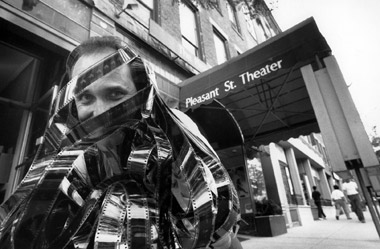By now you probably know the news. Pleasant Street Theater is shutting its doors and rolling up its screens, some three-plus decades after first making downtown Northampton a destination for lovers of foreign and independent films of all stripes.
The last shows have come and gone; the theater spent its final day giving free screenings of Peter Bogdanovich’s 1971 feature The Last Picture Show; if you hurried you might have been able to grab a seat somewhere. But chances are you were shut out. People loved this theater as people can only love a true neighborhood institution, and when the news broke, those often-empty seats began filling up pretty damn quick.
It’s been heartening, in a bittersweet way, to see that reaction among locals. But the truth—the hard truth—is that to most of the town it probably didn’t mean all that much. I worked at Pleasant Street for over a decade, beginning in the mid-’90s; I was the manager when it closed the first time, just before it was brought under Amherst Cinema’s nonprofit umbrella, so I have a good sense of what the current crop of employees might be going through right now. If it’s anything like last time, it’s going to be a frustrating week, and not for the reasons you might think.
The problem with being an institution is that people begin to take things for granted; they fall in love with the idea of a place rather than the place itself. Take it away—whether “it” is a small-time coffee shop or a funky old independent theater—and what people lament in its passing isn’t the loss of a place. There is always another coffee shop or another place to watch movies. (In fact, that’s likely why that quaint neighborhood joint is going out of business.)
No, what people are really mourning is something far more personal: they mourn the fact that they can no longer pretend that they belong to a community that can sustain a place like Pleasant Street.
I heard the news on a Friday morning. Whenever the topic came up in conversation over the weekend, I made a point of asking everyone if they remembered the last movie they saw at PST. Many did, and most had fond memories of the decidedly funky place. But by Monday, a definite pattern had emerged: most of the titles named were films that I had very likely projected myself. In other words, these people hadn’t been to Pleasant Street—the quirky local landmark that everyone loves to talk about—in over five years. What business could possibly survive that way?
I think we all knew, deep down, that the closing was just a matter of time. The closing of the neighboring Pleasant Street Video last year was a definite harbinger of things to come in terms of the cultural shift toward other means of consumption, and the shuttering of Pleasant Street is just another—and possibly not even bigger—example of that. It’s sad, of course, but it’s no tragedy, and acting as though it is only does a disservice to the community. It’s like watching a favorite, once-wild grandmother pass on in her sleep: she may have danced barefoot in the speakeasies of her youth, but that can’t last forever.
We should be glad for all the years we had with Pleasant Street, and remember her for what she was, but there’s no need for false nostalgia. She helped Northampton become the town we have today, but we have outgrown her.
Indeed, even John Morrison, who started PST back in the 1970s with Richard Pini, pushed for new and different venues in an online posting: “Hey guys, get real… there’s a higher awareness of art films now, but people DO vote with their feet. I wouldn’t go see a film at Pleasant Street! I want my art with good sight-lines and good sound,” he wrote, before suggesting that King Street may be the place to host the “next piece of Northampton cultural history.”
Of course, whether or not Northampton can again sustain a first-run theater of its own is still an open question. Certainly part of the downturn at PST can be traced to Netflix, on-demand options, and assorted other new-media means of consumption (just about every media giant offers some form of instant streaming nowadays that makes moviegoing more akin to channel surfing). If there’s a way to make it happen, it will likely be part of a more varied arts venue instead of a dedicated movie house. And that’s probably a good thing, in the long run—for people on both sides of the counter.
In the meantime, film remains alive and well. Northampton is surrounded by theaters, and once we all adjust our mindset a bit, driving to Amherst (or Hadley, or South Hadley, or Easthampton) won’t seem so odd. A few of us might even come to realize that stadium seating really is something worth seeking out, and that seeing even the most obscure of foreign films doesn’t have to mean dealing with film scratches or uneven sound. And of course, there are still other venues showing film in Northampton if you’re willing to seek them out (hint: keep an eye on this column).
In other words: the sky has not fallen, even if it seems that the stars are dangling a little lower than usual—so let’s give Pleasant Street her due, and not let what we wished for get in the way of what we’ve had.
Jack Brown can be reached at cinemadope@gmail.com.



